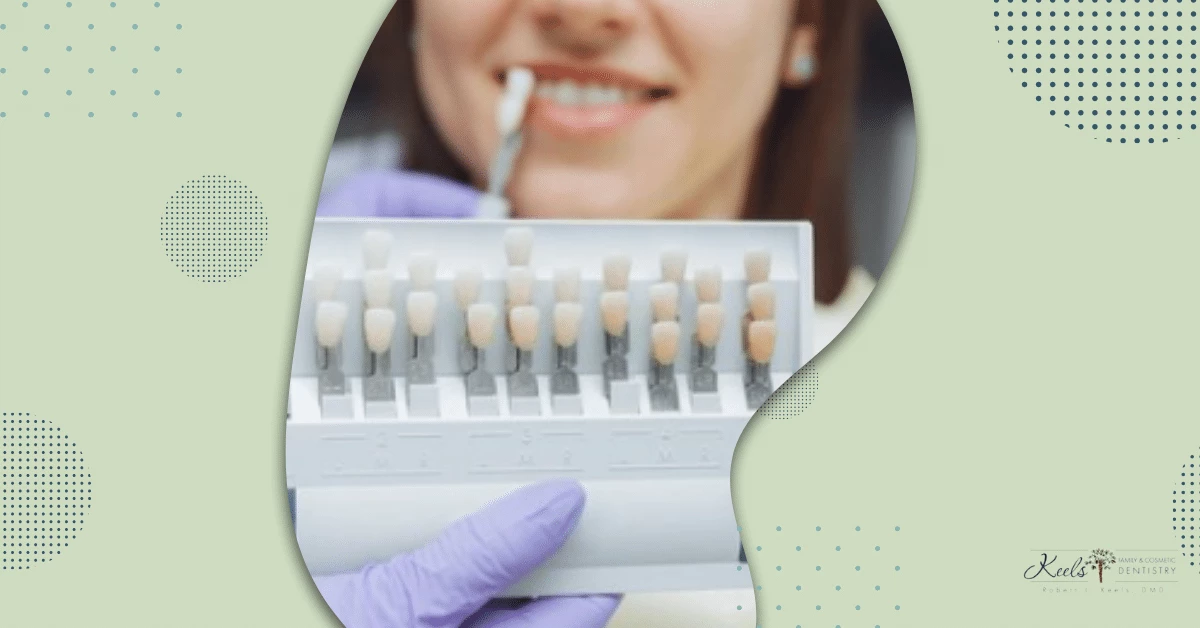SCHEDULE AN APPOINTMENT!
Root canals are a crucial aspect of modern dentistry, and at Keels Family & Cosmetic Dentistry, we specialize in providing exceptional root canal treatments. Our skilled team understands the importance of preserving natural teeth and ensuring optimal oral health.
With advanced techniques and state-of-the-art equipment, we strive to make the root canal experience as comfortable as possible for our patients. Whether it’s relieving pain or addressing infection, our dedicated professionals are committed to delivering high-quality care.
Trust us to restore your smile and alleviate any discomfort associated with root canals. Experience compassionate dental services at Keels Family & Cosmetic Dentistry today.
What is a Root Canal?
A root canal is a typical dental procedure that involves a procedure that needs to be understood. At Keels Family & Cosmetic Dentistry, educating our patients about root canals’ purpose and benefits is important.
Simply put, a root canal is a treatment used to save a tooth that has become infected or severely decayed. It involves removing the damaged or infected pulp from the inside of removing decay, disinfecting, cleaning, filling, and sealing a tooth to prevent further infection.
Root canals are typically recommended when the nerve tissue inside a tooth is severely damaged, numerous dental operations on the same tooth, cracks or chips in the tooth, or traumatic injury. These infections can lead to severe pain, abscesses, and even tooth loss if left untreated.
Contrary to popular belief, root canals are not painful procedures. With modern advancements in dentistry and local anesthesia techniques used at Keels Family & Cosmetic Dentistry, most patients report minimal discomfort during the process. Getting a root canal can relieve pain caused by an infected tooth.
By opting for a root canal instead of extracting the affected tooth, you can preserve your natural smile and avoid more extensive dental work such as dental implants or bridges. Root canals have a high success rate in saving teeth and restoring their normal function.
At Keels Family & Cosmetic Dentistry, our experienced team of dentists specializes in performing comfortable and effective root canal treatments. Your comfort and well-being are our top priorities every step of the way. We want to make sure you feel taken care of from start to finish.
If you are experiencing a persistent toothache or suspect needing a root canal treatment, we encourage you to schedule an appointment with us. Our skilled dentists will evaluate your condition thoroughly and recommend appropriate treatment options tailored to your needs.
Don’t let misconceptions about root canals deter you from seeking proper dental care. Contact Keels Family & Cosmetic Dentistry today, and let us help you restore your oral health and maintain a beautiful smile.

Non-Surgical Root Canal
At Keels Family & Cosmetic Dentistry, we know our patients deserve the best advanced and comfortable dental care possible. That’s why we offer non-surgical root canal treatments as an alternative to traditional surgical methods.
Non-surgical root canals involve using advanced techniques and technology to clean and disinfect the infected tooth from within without requiring invasive surgery. This approach eliminates the pain and discomfort associated with traditional surgical root canals and reduces the recovery time significantly.
Our experienced team of dentists is trained in performing non-surgical root canals with precision and expertise. We use state-of-the-art equipment and adhere to strict sterilization protocols to ensure your safety throughout the procedure.
By opting for a non-surgical root canal at Keels Family & Cosmetic Dentistry, you can expect a more comfortable experience without compromising quality or effectiveness. Our goal is excellent dental care that meets your needs while ensuring your comfort every step of the way.
Surgical Root Canal
Root canals are dental operations often associated with fear and discomfort. However, Keels Family & Cosmetic Dentistry strives to change that perception by offering top-notch surgical root canal treatments.
Our team of highly skilled and experienced dentists understands the importance of preserving natural teeth. Root canals are an effective solution for saving a tooth with serious damage or infection. Cleaning the root and removing the diseased pulp canal system, we can alleviate pain and prevent further complications.
At Keels Family & Cosmetic Dentistry, we prioritize patient comfort. Our state-of-the-art facilities have advanced technology to ensure precise and efficient treatment. We also offer sedation options for patients who may feel anxious or nervous about undergoing a surgical root canal.
If you’re experiencing tooth pain or suspect needing a root canal treatment, don’t hesitate to contact us at Keels Family & Cosmetic Dentistry. Our skilled dentists will carefully check out what’s going on with your teeth and give you personalized treatment options that are just right for you.
Reasons for a Root Canal
Root canals are a common dental procedure crucial in maintaining oral health and preserving natural teeth. At Keels Family & Cosmetic Dentistry, we understand that the need for a root canal may arise for various reasons.
One of the primary reasons for a root canal is when the innermost layer of the tooth, known as the pulp, becomes infected or inflamed. This can occur due to deep decay, repeated dental procedures on the same tooth, or traumatic injury to the tooth.
When left untreated, an infected or inflamed pulp can lead to severe pain, sensitivity to hot and cold temperatures, swelling, and even abscess formation. A root canal becomes necessary to remove the infected pulp and alleviate these symptoms.
By performing a root canal procedure at Keels Family & Cosmetic Dentistry, our experienced team can effectively save your natural tooth from extraction while relieving pain and discomfort.
Once the root canal is completed, we recommend placing a dental crown over the treated tooth for added strength and protection. This ensures that your restored tooth functions properly while seamlessly blending in with your natural smile.
We make the patient’s comfort our top priority throughout every stage of the treatment process. Your root canal will be performed by highly trained dentists who use the most up-to-date procedures and cutting-edge equipment available to ensure that the design is as comfortable for you as possible.
What to Expect After a Root Canal
After undergoing a root canal procedure at Keels Family & Cosmetic Dentistry, you can expect some positive outcomes. Root canals are a common dental treatment to save and restore a severely damaged or infected tooth. While the procedure may sound intimidating, it is important to understand the benefits and what to expect during recovery.
One of the primary benefits of a root canal is pain relief. If you have been experiencing severe toothache or sensitivity due to an infected pulp, the procedure will help alleviate your discomfort. By removing the infected tissue and cleaning the root canal system, your dentist will eliminate any pain associated with the infection.
Additionally, root canals help preserve your natural tooth structure. In many cases, extracting a severely damaged or infected tooth may seem easier. However, keeping natural teeth is always preferred as it maintains proper oral function and prevents adjacent teeth from shifting.
Following your root canal treatment at Keels Family & Cosmetic Dentistry, you can expect temporary sensitivity or mild discomfort around the treated area. This is normal and can be managed with over-the-counter pain medication, as your dentist recommends.
Following any post-operative instructions provided by your dentist after a root canal is crucial. This may include avoiding certain foods or activities that could disrupt the healing process. Your dentist will also schedule follow-up appointments to monitor your progress and ensure optimal healing.
Getting a root canal at Keels Family & Cosmetic Dentistry has many advantages, including eliminating pain and maintaining the patient’s natural teeth. Successful recovery and improved dental health are possible with consistent post-operative care and monitoring. Have faith in our skilled staff, committed to providing excellent dental care at every stage of your procedure.
Pricing
When it comes to root canals, pricing can vary depending on various factors. At Keels Family & Cosmetic Dentistry, we understand the importance of providing our patients with transparent and affordable dental care.
While providing an exact estimate without evaluating your specific case is difficult, we strive to offer competitive pricing for root canal procedures. Our team of experienced dentists will assess the complexity of your situation and provide you with a detailed breakdown of the costs involved.
We believe in delivering high-quality dental services while ensuring our patients receive fair and reasonable pricing. Rest assured that at Keels Family & Cosmetic Dentistry, we prioritize your oral health and aim to make root canal treatments accessible for everyone.
Don’t let concerns about pricing deter you from seeking the necessary dental care. Contact us today at Keels Family & Cosmetic Dentistry to schedule your appointment and take the first step towards a healthier smile.
How Do You Avoid A Root Canal?
A root canal is a popular treatment because it effectively resolves tooth infections and prevents new ones from forming. In addition, it saves the tooth from extraction and makes it more aesthetically pleasing. However, it does require some drilling into the tooth, so that it may be more costly than an extraction. To avoid having a root canal, you should brush your teeth at least twice daily and floss once during the day. Your dentist will also recommend using an antibacterial mouthwash each time you brush your teeth. This will help kill bacteria that might linger in your mouth after eating or drinking.
It will help if you visit the dentist every six months to ensure that your gums and teeth are healthy and free of infection. When you visit your dentist for a checkup, they’ll examine the health of your gums and will look at whether or not you need a deep cleaning. If they find that an infection has spread too deep into the roots of your teeth, you’ll need to have a root canal. Keels Family & Cosmetic Dentistry is just around the corner if you’re unsure about the status of your dental health. Call us or use our online form to schedule an appointment with our dentists.
Why Choose Keels Family & Cosmetic Dentistry?
Make An Appointment
At Keels Family & Cosmetic Dentistry, we understand that people choose our practice for a multitude of reasons. Our prime location offers convenience to our valued patients, making it easy to schedule appointments and prioritize their oral health. The trust and satisfaction of our patients, who often refer friends and family, have solidified our reputation as a professional and caring dental office within our community. Our comprehensive services range from cosmetic dentistry to dental care for the entire family, ensuring that we meet the unique needs of every member. We work with various dental insurance plans to make quality care accessible. With flexible scheduling, a warm and welcoming atmosphere, state-of-the-art technology, and a commitment to patient education, we aim to provide not just dental services but also a comfortable and personalized experience. At Keels Family & Cosmetic Dentistry, we prioritize the health and well-being of our patients above all else, fostering a strong personal connection with each individual who walks through our doors.



